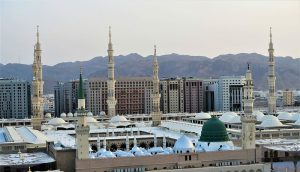Question: Will the nikaah be valid if the boy and girl conduct the nikaah alone without the presence of witnesses? Speaker: Ml. Ebrahim Salajee Duration: 00:01:03 Format: mp3 Size: 423 KB Download If you did not understand the maslah or any aspect of the maslah, then refer your question to Muftionline.co.za
Read More »Recent Posts
October, 2018
-
17 October
The Very First People to Accept Islam – Part Three
Whenever the hour of salaah would approach, Rasulullah (sallallahu ‘alaihi wasallam) would perform his salaah secretly in a valley or mountain pass. On one occasion, Rasulullah (sallallahu ‘alaihi wasallam) was performing his salaah with Hazrat ‘Ali (radhiyallahu ‘anhu) in a certain mountain pass when Abu Taalib suddenly came their way. …
Read More » -
17 October
The Islam of Hazrat Abu Bakr (radhiyallahu ‘anhu) – Part Two
As soon as Hazrat Abu Bakr (radhiyallahu ‘anhu) embraced Islam, he began to invite people towards Deen. Whenever he met his close friends or they met him, he would invite them towards Islam. As a result of his inviting to Islam, the following personalities from his friends entered the fold …
Read More » -
17 October
Enduring the Challenges of the Time
Hazrat Mufti Ebrahim Salejee (Daamat Barakaatuhu) mentioned: Every age has a different challenge. When Nabi (sallallahu ‘alaihi wasallam) left this world then there was the challenge of those who reneged from Islam. Then in one age there existed the challenge of preserving the ahaadeeth of Rasulullah (sallallahu ‘alaihi wasallam). These …
Read More » -
16 October
The Islam of Hazrat Abu Bakr (radhiyallahu ‘anhu) – Part One
When all his household members accepted Islam, Rasulullah (sallallahu ‘alaihi wasallam) invited his intimate friends and close associates to embrace this great blessing of Islam. The first person that he invited to bring Imaan and accept Islam was his faithful friend, his childhood acquaintance and his intimate confidant, Hazrat Abu …
Read More »
-
Hazrat Abu Zarr’s (radhiyallahu ‘anhu) Great Respect and High Regard for Hazrat Uthmaan (radhiyallahu ‘anhu)
A man from the Banu Sulaym tribe mentioned the following: “I was once seated in …
Read More » -
Hazrat Moulana Muhammed Yusuf’s (rahimahullah) Disinterest in the Dunya – Adherence to The Sunnah – Part 55
-
Hazrat Abu Zarr (radhiyallahu ‘anhu) moving to Shaam and Rabadhah
-
True Achievements – The Achievements of Deen – Adherence to The Sunnah – Part 54
-
Hazrat Abu Zar’s (radhiyallahu ‘anhu) Quality of Worldly Abstinence
-
Receiving Seventy Rewards
Hazrat Abdullah bin Amr bin Aas (radhiyallahu ‘anhuma) reported, “Whoever sends salutations upon Nabi (sallallahu ‘alaihi wasallam) once,...
Read More » -
Increase in Sustenance
-
The Reward of Fasting on the Day of Arafah
-
The Angel that Stands at the Blessed Grave of Hazrat Rasulullah (sallallahu ‘alaihi wasallam) to Convey the Durood of the Ummah
-
Reciting Durood when Entering the Musjid
-
Sunnats and Aadaab of the Guest – 4
16. The guest should not eat all the food which the host serves in the …
Read More » -
Sunnats and Aadaab of the Guest – 3
-
Sunnats and Aadaab of the Guest – 2
-
Sunnats and Aadaab of the Guest – 1
-
Sunnats and Aadaab of the Host – 6
-
Hazrat Umar bin Khattaab (radhiyallahu ‘anhu)
Hazrat Umar (radhiyallahu ‘anhu) is the second khalifah of Islam and the greatest person of …
Read More » -
Hazrat Ali (radhiyallahu ‘anhu) – Part Forty-One – Being Sent by Rasulullah (sallallahu ‘alaihi wasallam) to Level the Graves, Destroy Idols and Erase Pictures
-
Rasulullah (sallallahu ‘alaihi wasallam) Approving of the Verdict of Hazrat Ali (radhiyallahu ‘anhu) – Part Forty
-
The True Ulamaa – Hazrat Ali (radhiyallahu ‘anhu) – Part Thirty Nine
-
Du‘aa for Assistance in Settling Debts – Hazrat Ali (radhiyallahu ‘anhu) – Part Thirty Eight
 Ihyaaud Deen An Effort to Revive Deen in Totality
Ihyaaud Deen An Effort to Revive Deen in Totality


























































































